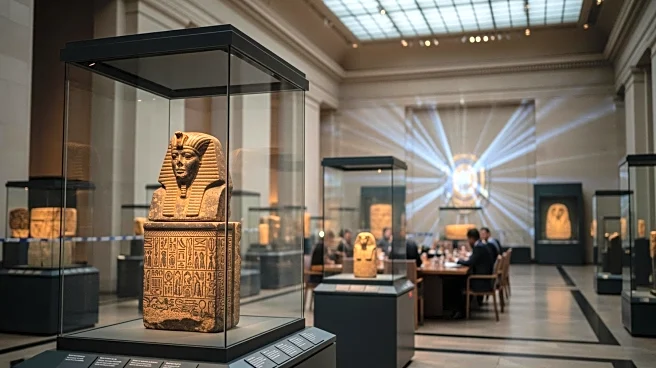What's Happening?
The opening of the Grand Egyptian Museum in Giza has reignited calls for the British Museum to return the Rosetta Stone to Egypt. The artifact, taken by British forces in 1801, was pivotal in deciphering Egyptian hieroglyphs. Former Egyptian officials
and Egyptologists, including Zaha Hawass, are advocating for the restitution of key artifacts taken during colonial times. Hawass has specifically called for the return of the Rosetta Stone, the Zodiac from the Louvre, and the Bust of Nefertiti from Berlin. Despite these calls, the British Museum cites legal barriers under the British Museum Act of 1963, which restricts the permanent return of objects from its collection. The museum has stated that no formal request has been made by the Egyptian government for the repatriation of the Rosetta Stone.
Why It's Important?
The demand for the return of the Rosetta Stone highlights ongoing debates about the restitution of cultural artifacts taken during colonial periods. The Grand Egyptian Museum's opening underscores Egypt's readiness to reclaim its heritage, potentially influencing international policies on artifact repatriation. The British Museum's legal constraints reflect broader challenges faced by institutions in returning historical objects, impacting diplomatic relations and cultural heritage preservation. The situation could affect tourism and cultural diplomacy, as Egypt positions itself as a major player in the global cultural landscape.
What's Next?
The British Museum's response indicates no immediate plans to return the Rosetta Stone, but ongoing discussions may lead to formal requests from Egypt. The museum's collaboration with Egyptian authorities on exhibitions and research could evolve, potentially influencing future negotiations. The international community may see increased advocacy for artifact restitution, prompting museums worldwide to reassess their policies. Egypt's strategic focus on cultural heritage could drive further initiatives to reclaim artifacts, impacting global museum practices and international relations.
Beyond the Headlines
The debate over the Rosetta Stone's return raises ethical questions about the ownership and stewardship of cultural heritage. It challenges museums to balance historical acquisition practices with modern ethical standards. The situation may prompt legal reforms, encouraging institutions to develop frameworks for artifact restitution. Additionally, it highlights the cultural significance of artifacts in national identity and historical narrative, influencing public perception and cultural diplomacy.
















